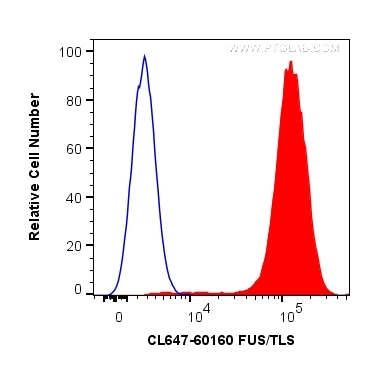- Featured Product
- KD/KO Validated
FUS/TLS Monoklonaler Antikörper
FUS/TLS Monoklonal Antikörper für FC (Intra)
Wirt / Isotyp
Maus / IgG1
Getestete Reaktivität
Hausschwein, human, Maus, Ratte
Anwendung
FC (Intra)
Konjugation
CoraLite® Plus 647 Fluorescent Dye
CloneNo.
3A10B5
Kat-Nr. : CL647-60160
Synonyme
Galerie der Validierungsdaten
Geprüfte Anwendungen
| Erfolgreiche Detektion in FC | K-562-Zellen |
Empfohlene Verdünnung
| Anwendung | Verdünnung |
|---|---|
| Sample-dependent, check data in validation data gallery | |
Produktinformation
CL647-60160 bindet in FC (Intra) FUS/TLS und zeigt Reaktivität mit Hausschwein, human, Maus, Ratten
| Getestete Reaktivität | Hausschwein, human, Maus, Ratte |
| Wirt / Isotyp | Maus / IgG1 |
| Klonalität | Monoklonal |
| Typ | Antikörper |
| Immunogen | FUS/TLS fusion protein Ag2150 |
| Vollständiger Name | fusion (involved in t(12;16) in malignant liposarcoma) |
| Berechnetes Molekulargewicht | 75 kDa |
| Beobachtetes Molekulargewicht | 75 kDa |
| GenBank-Zugangsnummer | BC026062 |
| Gene symbol | FUS |
| Gene ID (NCBI) | 2521 |
| Konjugation | CoraLite® Plus 647 Fluorescent Dye |
| Excitation/Emission maxima wavelengths | 654 nm / 674 nm |
| Form | Liquid |
| Reinigungsmethode | Protein-G-Reinigung |
| Lagerungspuffer | BS mit 50% Glyzerin, 0,05% Proclin300, 0,5% BSA, pH 7,3. |
| Lagerungsbedingungen | Bei -20°C lagern. Vor Licht schützen. Nach dem Versand ein Jahr stabil. Aliquotieren ist bei -20oC Lagerung nicht notwendig. 20ul Größen enthalten 0,1% BSA. |
Hintergrundinformationen
FUS (also named TLS and POMp75) belongs to the RRM TET family. FUS may play a role in the maintenance of genomic integrity; it binds both single-stranded and double-stranded DNA and promotes ATP-independent annealing of complementary single-stranded DNAs and D-loop formation in superhelical double-stranded DNA. FUS is also an RNA-binding protein, and its links to neurodegenerative disease proffer the intriguing possibility that altered RNA metabolism or RNA processing may underlie or contribute to neuron degeneration. Two research groups simultaneously reported that FUS is present in 5% of the pathalogical aggregations (inclusions) seen in familial amyotrophic sclerosis (fALS). FUS-positive inclusions were also reported in cases of sporadic ALS (sALS). More recently, wild-type FUS has also been implicated in the pathological development of frototemporal lobar dementia (FTLD) with ubiquitin-positive inclusions (FTLD-U), further linking FUS to the pathogenesis of neurogenerative diseases. There is some debate as to whether FUS colocalizes with TDP-43 in TDP-43-positive cases of ALS and whether TDP-43 and FUS cause neurodegenerative disease independently or contributively of one another. This antibody is a mouse monoclonal antibody raised against an internal region of human FUS. Initial reports from our customers suggest this new monoclonal FUS antibody (60160-1-Ig) is a useful tool in ALS and FTLD research. For more details, please see our blog article regarding the matter.
Protokolle
| Produktspezifische Protokolle | |
|---|---|
| FC protocol for CL Plus 647 FUS/TLS antibody CL647-60160 | Protokoll herunterladen |
| Standard-Protokolle | |
|---|---|
| Klicken Sie hier, um unsere Standardprotokolle anzuzeigen |


